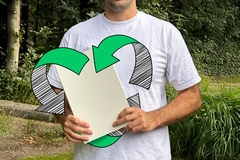Elopak helps Dutch children to shake, sprinkle and enjoy!
18 Jun 2014

A Dutch delicacy that’s a favourite with children - Schuddebuikjes from Netherlands baker Bolletje - are tiny cookies that can be sprinkled on bread, eaten by themselves or used as a pie-crust base or dessert topping.
A Dutch delicacy that’s a favourite with children - Schuddebuikjes from Netherlands baker Bolletje - are tiny cookies that can be sprinkled on bread, eaten by themselves or used as a pie-crust base or dessert topping. Literally translated into English as ‘Shaking Bellies’, Schuddebuikjes are tiny domes of lightly browned and spiced, shortcrust biscuit or cookie - known in Dutch as ‘Speculaas’.
With 15 years of success behind the product and sales still increasing, Bolletje has recently revamped and extended the line with the introduction of a new product called ‘Schuddebuikjes Duo’, together with updated packaging for its existing sister product - Schuddebuikjes. Both Schuddebuikjes and Schuddebuikjes Duo are now packaged in 750 ml Pure-Pak® Diamond carton with Curve with resealable cap to keep the contents fresh and crunchy at all times.
The new ‘Schuddebuikjes Duo’ contains mini cookies in two different flavours: chocolate and caramel-vanilla. This combination was deemed ‘very tasty’ by 95% of consumers following market research by Bolletje.
To keep the brand current and alive, consumers can choose from six different packs with a variety of games, recipes and children’s puzzles on each of them. The introduction of Bolletje Schuddebuikjes Duo has been supported with print advertising and in-store promotions.
Dutch children traditionally enjoy creating their own ‘biscuit or cookie sandwich’, and with the new closure, it’s even easier for them to sprinkle the little Schuddebuikjes cookies onto bread. The cap is also integral to the carton design as it forms a clown’s nose, with the additional diamond panel on the gable top providing space for the clown’s smile. Bolletje has 500 employees spread over its bakeries in Almelo, Heerde and Amsterdam, with a rich baking history that dates back more than 140 years.
Source: Elopak
All content and features on this website are copyrighted with all rights reserved. The full details can be found in our privacy statement
Subscribe to our newsletters
By continuing to browse our site you agree to our Privacy Statement











